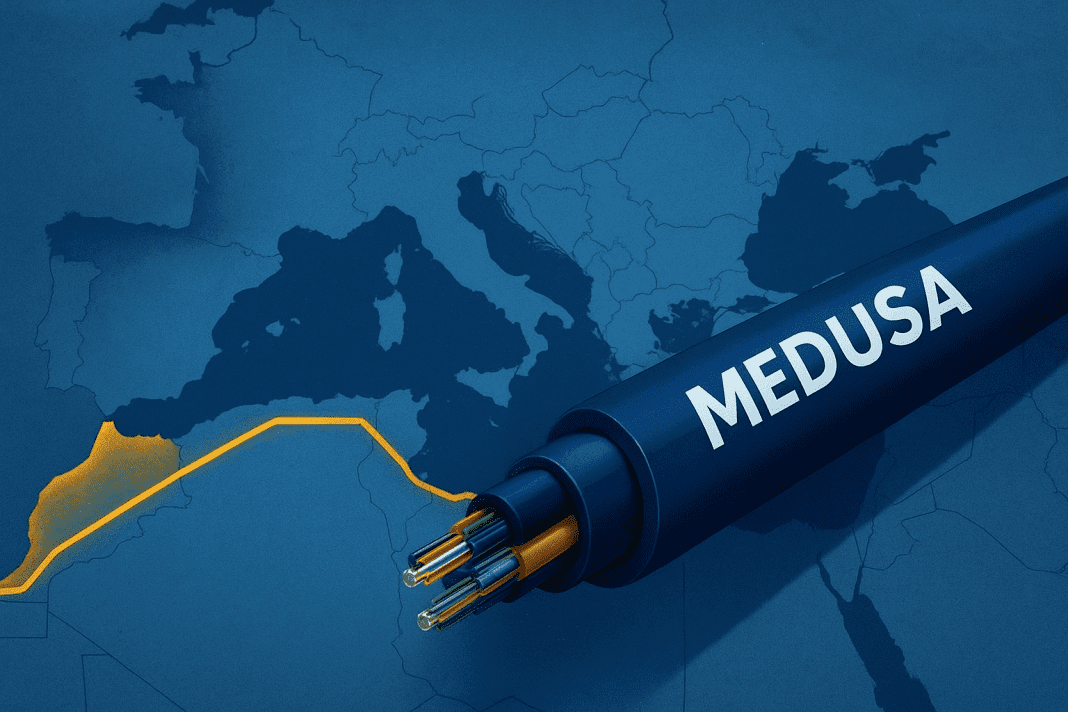Syria has taken a major step toward modernizing its internet and communication systems. The country’s state-run Ikhbariya TV announced that the Ministry of Telecommunications has signed an agreement for the landing of the Medusa Submarine Cable System in Syria. This project is considered one of the most significant digital infrastructure developments in the country’s history.
Historic Deal with Medusa Marks Syria’s First International Submarine Connection
The Medusa Submarine Cable marks a historic milestone for Syria, as it becomes the country’s first international undersea internet connection. As a result, this new link will directly connect Syria to global internet networks, greatly improving the nation’s access to high-speed, stable, and secure online communication. For years, Syria has depended on limited regional routes that restricted data flow and connectivity. Therefore, this agreement represents a significant breakthrough in the country’s digital development.
The Medusa system is one of the largest undersea cable networks ever planned for the Mediterranean. Stretching across 12 countries in North Africa and southern Europe, it serves as a vital bridge between continents. In other words, it strengthens the digital ties between Europe and Africa.
Finland and Sweden race to build secure submarine cable after wave of Baltic undersea attacks
By carrying massive volumes of data through fiber-optic lines laid deep under the sea, the system enables faster international communication and reduces the risk of network disruptions. Moreover, this initiative reflects a broader regional effort to expand digital infrastructure and connectivity across borders.
Eventually, the Medusa cable will extend toward West Africa, creating one of the most extensive and connected data corridors in the region. With its arrival in Syria, the nation becomes part of this expanding global web of communication. This connection not only strengthens Syria’s digital infrastructure but also places it firmly on the map of international data exchange networks.
Medusa Boosts Connectivity, Communication, and Digital Access
The introduction of the Medusa submarine cable represents a transformative leap for Syria’s communication landscape. Once the system is operational, it will allow the nation to access faster, more stable, and more secure internet services. This development aims to improve the quality of online access for both citizens and businesses.
Syria’s telecommunications ministry highlighted that this deal forms part of a larger national effort to rebuild and enhance digital infrastructure. The project aligns with the government’s plan to accelerate economic development and bridge the digital divide between urban and rural regions.
???? Wall Street shocker! Interactive Brokers fined $11.8M for serving sanctioned nations
including Iran, Cuba, and Syria
Reports indicate that Syria has been holding discussions with several major regional telecom operators — Zain, Etisalat, STC, and Ooredoo — for an estimated $300 million project. This larger project seeks to develop Syria’s fiber-optic communications network, which will work together with the Medusa submarine system. By linking the undersea cable to Syria’s ground-based fiber network, the country will create a direct and reliable communication pathway to international networks.
Through this integration, Syria expects to reduce its dependence on costly mobile data and improve the affordability of internet services. The combination of a modern submarine cable and an upgraded fiber-optic network will make high-speed connections more widely available to the population.
This progress will also benefit key sectors such as education, business, and technology. Students will have better access to online learning materials, while companies will be able to use digital tools for trade, innovation, and communication. Families across the nation could experience faster streaming, smoother video calls, and easier access to online services.
Strengthening Regional Ties and Digital Transformation Efforts
The Medusa cable project represents both a technological breakthrough and a step toward regional cooperation. By joining the Spain-based Medusa Submarine Cable System, Syria is linking its network to one of the Mediterranean’s most advanced digital routes.
The Medusa system connects countries such as Portugal, Spain, France, Italy, Algeria, Tunisia, Greece, Cyprus, and Egypt, and its arrival in Syria creates direct access to multiple data exchange hubs across Europe and Africa.
This new connection will serve as a gateway for international internet traffic, allowing faster, more reliable access to global data centers. It is expected to enhance the quality of internet services, including voice calls, video communication, and online transactions.
U.S. immigration judge orders pro-Palestinian activist Mahmoud Khalil deported to Algeria or Syria
Officials describe the move as part of Syria’s broader effort to modernize its telecommunications infrastructure and promote digital inclusion. By investing in advanced connectivity, Syria strengthens its position in regional data networks and improves access to communication technologies.
The partnership with Spain’s Medusa network marks the start of a new phase for Syria’s digital development. It not only supports public and private sectors but also symbolizes the nation’s commitment to rebuilding and advancing its communication capabilities in today’s digital world.
